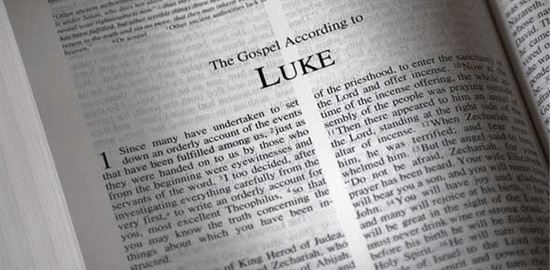Lesson 6: The Gospel According to Luke
 If Matthew adds mercy to Mark’s power, Luke goes a step further and presents the Gospel as grace. Right from the beginning, the message is a gift to those regarded at the far end of God’s care. It is good news to the poor, not the poor in spirit. It is addressed to women as much, if not more than, men. The angel prepares pregnant Mary, not embarrassed Joseph. Lowly shepherds, not prestigious wise men, welcome the Christ Child.
If Matthew adds mercy to Mark’s power, Luke goes a step further and presents the Gospel as grace. Right from the beginning, the message is a gift to those regarded at the far end of God’s care. It is good news to the poor, not the poor in spirit. It is addressed to women as much, if not more than, men. The angel prepares pregnant Mary, not embarrassed Joseph. Lowly shepherds, not prestigious wise men, welcome the Christ Child.
You sense the same at the end of the book. Unlike Mark and Matthew where the only word remembered from the Cross is a cry of abandonment, Luke has Jesus forgive his executioners as well as a thief who shares his fate. We should notice the reasoning is they do not know what they are doing. You sense complete helplessness to rescue themselves so that God in Christ must do it all.
And in between, you read marvelous stories of God’s grace rather than moral teachings. I at least remember the Prodigal Son when I think of Luke and “Forgive your enemies” when it comes to Matthew. The parable of the wedding feast ends with all the riff-raff from the alleys celebrating, unlike Matthew who feels it is necessary to exclude some who do not wear proper wedding garments
Throughout the book, there is great sensitivity for people who suffer. The poor, such as Lazarus, receive promises while the rich, such as the Rich Ruler (Luke 18:18-30) and the Rich Fool (Luke 13:12-31), are denounced. Beaten travelers are rescued by caring foreigners.
Even carrying the genealogy all the back to Adam, in contrast to Matthew’s stopping with the promise to Father Abraham, indicates God extending his love and the Beloved Community to those totally unprepared.
And finally, even the resurrection appearances convey the grace of the Gospel. Unlike Mark and Matthew, where Christians are challenged to carry on the mission, Luke pictures believers being transformed by the love they are offered by the Risen Christ. The resurrections become an opening of minds and a warming of hearts.
Christianity is not about learning how to live with evil. It is completely about God casting evil from his corrupted creation. We are instructed to do that by overcoming evil with love. And we are able to do that because the Gospel transforms us. Luke pictures that as a gracious Father welcoming his children home.

 Frontline Study is an online discussion of the scriptures, inviting you to share your comments and your reflections on each weekly topic. Simply click on the "Add Reply" text at the top of each post to see what others have posted and to add your thoughts.
Frontline Study is an online discussion of the scriptures, inviting you to share your comments and your reflections on each weekly topic. Simply click on the "Add Reply" text at the top of each post to see what others have posted and to add your thoughts.